Nuisance Alligator Control In Southwest Florida
What To Do When Alligators Become A Nuisance
An alligator is usually deemed a "nuisance" once they reach a length over 4' and have become a danger or threat to people, pets or property.
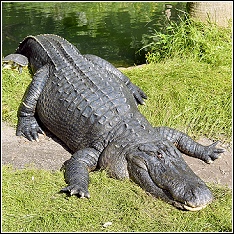
The Florida Fish and Wildlife Conservation Commission established the Statewide Nuisance Alligator Program, also known as SNAP, to address concerns regarding alligators. SNAP operates an alligator hotline, 866-FWC-GATOR (866-392-4286), a number which concerned individuals can call to report a nuisance alligator in their area.
SNAP maintains a list of wildlife management professionals with the proper permits in place to be deemed a Nuisance Alligator Trapper, these trappers are contacted and dispatched by SNAP as deemed necessary. In 2016, alligator complaints led to the removal of over 8,000 alligators from Florida waters through the SNAP program.
Crocodile & Alligator Control
Smaller gators and crocs, under 4', are seldom a problem as long as you don't try to handle or aggravate them. Once they have grown larger in size the chances of them becoming a threat to pets or humans increases.
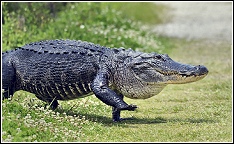
Removal
Once an alligator has become a nuisance and SNAP has deemed it's removal necessary, a Nuisance Alligator Trapper will be called in to trap and remove the animal to be euthanized at a later time.
Nuisance alligators in Florida are euthanized, rather than relocated. This is because relocated alligators usually try to return to the area where they were initially trapped, creating problems along the way and becoming more difficult to recapture.
Relocation across a great distance isn't the answer either. The introduction of a relocated alligator would create potential issues for the alligator population already living there, including conflict and injury, introduction of disease and ecological disruption.
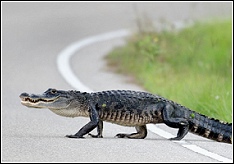
The occasional removal of an alligator has little impact on the state's overall alligator population in general, consequently, since relocation methods are not a viable solution, wildlife officials in the state have chosen to use trap and kill methods to control nuisance alligators.
Prevention
Reduce Access To Water Around Your Property
There are steps you can take to help prevent alligator problems around your home. A good place to start, when possible, is taking steps to cut back on access to water sources on your property, i.e, draining ponds.
Any kind of large hole that can fill with rain water can become an inviting habitat for alligators too, including borrow pits like the one below.

Borrow pits are large holes created when dirt or sand is excavated and carried away for construction needs in another area. These holes can fill with water making it a potential home or resting spot for alligators.
Alligators also enjoy lurking among floating vegetation or plants rooted in lake bottoms or shorelines that extend out above the water (emergent plants). Below is an example of emergent plants rooted in a lake with their tops rising above the surface.
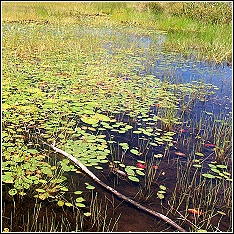
Cut down on the water and vegetation attractants around your property and you will likely see a decrease in the alligators around it too.
Don't Feed Alligators
Alligators want 3 things - food, water, shelter. In short, if you feed them they will come. It is illegal to feed gators - punishable by a $500 fine.
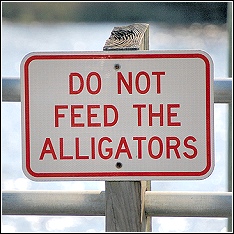
It is also important to know that feeding an alligator can encourage it to lose its fear of humans. Once it learns to associate humans as a source of food, then they may very likely start assuming "all" humans carry food with them and start attacking humans to get that food.
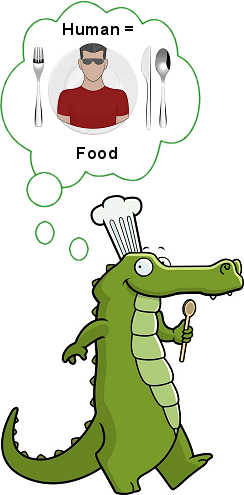
The Difference Between Alligators And Crocodiles
The physical characteristics differ a bit between crocodiles and alligators. Crocodiles, like the one seen in the photo below, have greyish color and a narrow, tapered snout. Alligators have a broader snout and are more blackish in color. Young crocodiles are light in color with black stripes, and young alligators are black with yellow stripes.
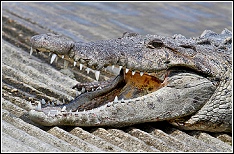
Crocodiles in Florida are found mostly along the coastal areas in the southern half of the state, whereas alligators, which are more numerous in number, are found throughout.
Crocodiles tend to prefer coastal, brackish and saltwater habitats, whereas alligators are more likely to prefer freshwater habitats such as canals, rivers, lakes and ponds.
The American crocodile is actually somewhat shy, seems to prefer a secretive presence, and would rather avoid humans than aggressively pursue them. However, if you suspect that you may have a nuisance or dangerous crocodile in your area, the best place to start is by calling the SNAP Alligator Hotline (866-392-4286) for assistance.
1242 SW Pine Island Rd., Suite 310
Cape Coral, Florida 33991-2126
help@totalwildlifecontrol.com














